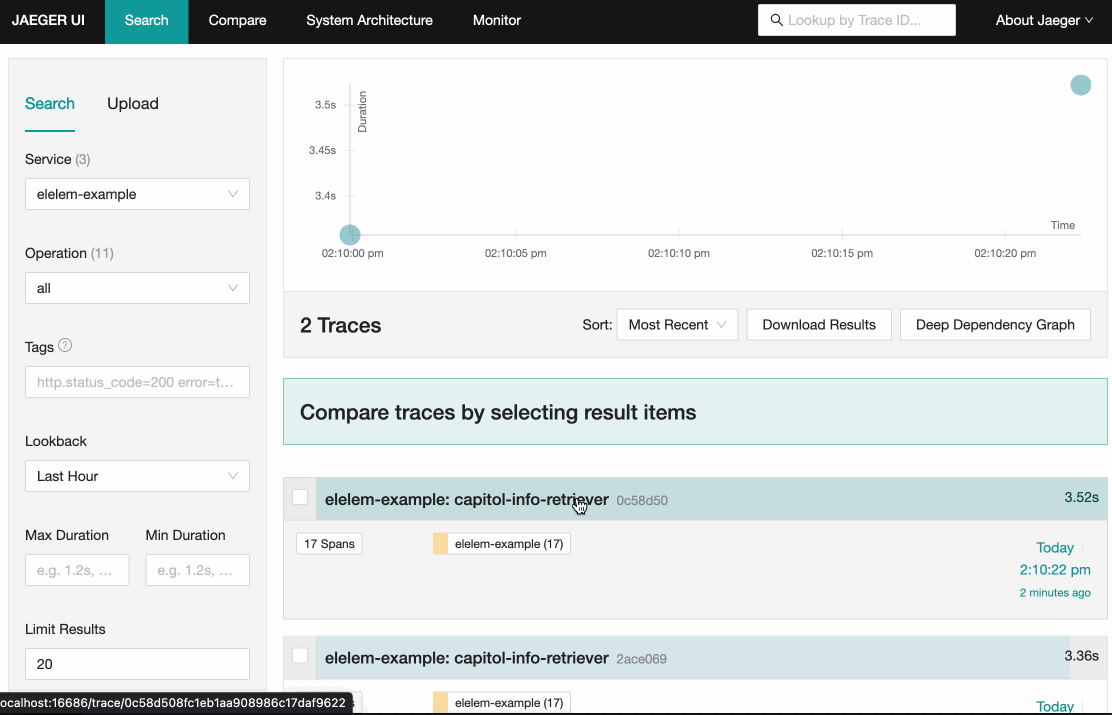elelem
v0.0.10
Published
Simple, opinionated, JSON-typed, and traced LLM framework for TypeScript.
Maintainers
Readme

Elelem
Elelem is a simple, opinionated, JSON-typed, and traced LLM framework in TypeScript.
Why another LLM library?
In September 2023, I tried to port MealByMeal, a production LLM-based application, over to LangChain.
Caching wasn't supported for chat-based endpoints (specifically for gpt-3.5-turbo).
Additionally, the interface for interacting with these endpoints felt quite awkward.
Since then, LangChain Expression Language (LCEL) was introduced, but handling and enforcing typed outputs is still repetitive and error-prone.
Furthermore, without leveraging gpt-4, the structured outputs are seldom valid.
For debugging nuances like retries and parsing errors, the in-built tracing leaves much to be desired.
All of these issues led me to create my own lightweight library.
How does Elelem compare to LangChain?
| Feature | Elelem | Langchain | |-----------------------------------------------|--------|-----------| | TypeScript library | ✅ | ✅ | | OpenAI generation support | ✅ | ✅ | | Cohere generation support | ✅ | ✅ | | Anthropic generation support | ✅ | ✅ | | Emphasis on typed LLM outputs | ✅ | ❌ | | Easily composable multi-step LLM workflows | ✅ | ❌ | | Convenient API for single chat completions | ✅ | ❌ | | Caching for OpenAI chat endpoints | ✅ | ❌ | | OpenTelemetry support | ✅ | ❌ | | Autogenerated JSON examples in prompts | ✅ | ❌ | | Python library | ❌ | ✅ | | Support for many models (Claude, Llama, etc.) | ❌ | ✅ | | Vector store support | ❌ | ✅ | | A million other features | ❌ | ✅ |
Example
Install with npm install elelem or yarn add elelem.
You'll need yarn add zod openai and yarn add ioredis if you're using Redis for caching (see src/elelem.test.ts for an example of setting up caching).
Usage:
import { z } from "zod";
import OpenAI from "openai";
import { elelem, JsonSchemaAndExampleFormatter } from "elelem";
const capitolResponseSchema = z.object({
capitol: z.string(),
});
const cityResponseSchema = z.object({
foundingYear: z.string(),
populationEstimate: z.number(),
});
const llm = elelem.init({
openai: new OpenAI({ apiKey: process.env.OPENAI_API_KEY })
});
const inputCountry = "USA";
(async () => {
const { result, usage } = await llm.session(
"capitol-info-retriever",
{ openai: { model: "gpt-3.5-turbo" } },
async (c) => {
const { result: capitol } = await c.openai(
"get-capitol",
{ max_tokens: 100, temperature: 0 },
`What is the capitol of the country provided?`,
inputCountry,
capitolResponseSchema,
JsonSchemaAndExampleFormatter,
);
const { result: cityDescription } = await c.openai(
"city-description",
{ max_tokens: 100, temperature: 0 },
`For the given capitol city, return the founding year and an estimate of the population of the city.`,
capitol.capitol,
cityResponseSchema,
JsonSchemaAndExampleFormatter,
);
return cityDescription;
},
);
console.log(result);
// { foundingYear: '1790', populationEstimate: 705749 }
console.log(usage);
// {
// completion_tokens: 26,
// prompt_tokens: 695,
// total_tokens: 721,
// cost_usd: 0.0010945
// }
})();Viewing Traces on Jaeger
Start Jaeger locally using:
docker run --rm --name jaeger \
-e COLLECTOR_ZIPKIN_HOST_PORT=:9411 \
-p 6831:6831/udp \
-p 6832:6832/udp \
-p 5778:5778 \
-p 16686:16686 \
-p 4317:4317 \
-p 4318:4318 \
-p 14250:14250 \
-p 14268:14268 \
-p 14269:14269 \
-p 9411:9411 \
jaegertracing/all-in-one:1.49Allow publishing traces to Jaeger with the following:
import * as opentelemetry from "@opentelemetry/sdk-node";
import { OTLPTraceExporter } from "@opentelemetry/exporter-trace-otlp-proto";
const sdk = new opentelemetry.NodeSDK({
serviceName: "your-service-name",
traceExporter: new OTLPTraceExporter(),
});
sdk.start();
// rest of your code...
process.on('SIGTERM', () => {
sdk.shutdown()
.then(() => console.log('Tracing terminated'))
.catch((error) => console.log('Error terminating tracing', error))
.finally(() => process.exit(0));
});When you run your code, your traces will be available at http://localhost:16686/.
What do the traces look like in Jaeger?

Tracing in Production
See the OpenTelemetry docs for more information on sending traces to hosted instances of Zipkin, Jaeger, Datadog, etc.
Contributing
Pull requests are welcome. For major changes, please open an issue first to discuss what you would like to change.
Please make sure to update tests as appropriate.
For Contributors: Running Integration Tests
To run tests, first make sure you have Git, Yarn, and Docker installed. Then checkout the repo and install dependencies:
git clone [email protected]:jrhizor/elelem.git
cd elelem
yarn installCreate a .env file:
OPENAI_API_KEY=<your key>
REDIS=redis://localhost:6379Start up Redis:
docker run -it -p 6379:6379 redisStart up Jaeger:
docker run --rm --name jaeger \
-e COLLECTOR_ZIPKIN_HOST_PORT=:9411 \
-p 6831:6831/udp \
-p 6832:6832/udp \
-p 5778:5778 \
-p 16686:16686 \
-p 4317:4317 \
-p 4318:4318 \
-p 14250:14250 \
-p 14268:14268 \
-p 14269:14269 \
-p 9411:9411 \
jaegertracing/all-in-one:1.49Now you're ready to run the unit and integration tests:
yarn test